CommentsNEIGHBORHOOD POLITICS-This video was made after I took my last Ethics Training around 2012 when I took my last Ethic’s Training in the Wilshire District with City Attorney Darren Martinez, I believe that they were filming that meeting for training purposes. I would love to see that video!
As a former West Hills Neighborhood Council (WHNC) Board member, I took my first mandatory Ethics Training when I joined the WHNC Board in 2008. I tried to take it online, but I preferred the training that I got from the City Attorney directly.
Ethics Training includes not only “The Brown Act” but training on “Conflicts of Interest” under the State of California Guidelines.
For example, State Officials can take their Ethics Training Courses from this weblink.
Neighborhood Councils can get their training through this web portal:
EMPOWERLA, the City Department which oversees, and trains Neighborhood Council members, not only tracks which Board members have taken their Ethics and other trainings, but are now requiring, to the best of my understanding, that Neighborhood Council Committee members who are not Board members take the same trainings. However, currently, the portal is not open to the public. In other words, since I am not a Neighborhood Council Board member, I cannot log in to the training to learn what is currently being taught to new and current Board members.
At this time, there are 99 Neighborhood Councils as I referenced in my previous article:
LA Made a Serious Mistake in the Way They Created Neighborhood Councils (citywatchla.com)
Why am I questioning how The Brown Act pertains to Neighborhood Councils and postings?
From my training and my ongoing relationships with multiple Neighborhood Councils, it is my understanding that the Neighborhood Council had three minimum requirements for posting their agendas related to Neighborhood Council Board meetings, Neighborhood Council Committee meetings, and other Neighborhood Council events.
- Originally, it is my understanding that each Neighborhood Council was required to post physical agendas at various locations. For example, I believe that at one time, the West Hills Neighborhood Council was obligated to post their agendas at three or more locations? (It was not my obligation to do the posting, so I do not recall all the locations). I believe one was at Shadow Ranch Park (I believe that is still the physical posting location). I believe that one location was at Trader Joe’s on a Fallbrook bulletin board. And I think that a third location may have been in a clubhouse in a private community in West Hills.
- Later, when Neighborhood Councils began to have their own websites, the requirement was to post the agendas on the Neighborhood Council websites.
- Finally, a new requirement was made – to submit the Agenda to EMPOWERLA for posting, and it would be sent out via their Notification system. If you want to subscribe to notices of a Neighborhood Council’s meetings, you can fill out the webform here.
What happened to make me research the Brown Act and Posting requirements?
In December, I was alerted to a Board meeting of a local Neighborhood Council. I went to their website the night before the meeting, and the agenda was not posted. I am also signed up to receive this Neighborhood Council’s agendas through the City Notification system. And I did not receive that notice within 24 hours of that Board meeting. To me, this is a violation of the Brown Act.
I checked the website on the day of the meeting, and the agenda was still not posted as of 8:50 a.m. on the day in which that meeting was being held. I know that time exactly because an attorney told me that if you ever want to save information on a website, to save it as a pdf where it cannot be altered – which I did. I have their website home page saved on my computer at that time on that date. I did not receive the notification from the City until 9:48 a.m. the day of the meeting – again, not in compliance with the 24-hour minimum advance notification.
Why is that potential Brown Act violation important?
- By not noticing the “Special Meeting” as required by The Brown Act with minimally 24 hours’ notice, residents, business owners, and other stakeholders may not have been aware of the meeting.
- It implies that whoever was posting the agenda was not doing so in compliance with The Brown Act. Was this person trained in these requirements? What is EMPOWERLA telling the Neighborhood Council members regarding how soon to get agendas to them to comply with The Brown Act posting requirements?
- There may have been development projects on the agenda that could potentially impact a specific neighborhood, and residents or other stakeholders may have wanted to weigh in on one or more project.
- There may have been expenditures of Neighborhood Council funds – again, someone may have wanted to weigh in regarding how the Neighborhood Council spends their funding.
- Transparency – The Brown Act and California’s Open Meeting Laws requirements require posting of Agendas, and in my opinion, Minutes, for transparency.
What action did I take in regard to this meeting and what were the results of that action?
I wrote to the Neighborhood Council President. I explained that I had wanted to attend their meeting, but that I did not receive the agenda in time to participate at that meeting via ZOOM.
I told the President that I thought that the Board may have been in violation of The Brown Act because of the lack of 24-hour notice for a “Special Meeting.”
What response did I get from that Neighborhood Council President?
“Dear Ms. Rowe,
I am responding to a complaint that we have received pertaining to an alleged Brown Act violation that was said to have been committed when the redacted Neighborhood Council redacted failed to post a notice of a Special Board Meeting that took place on December redacted at redacted. Specifically, you are alleging that the failure of the board to post the notice of this meeting on the redacted website constituted a violation of the Brown Act.
I have reviewed the allegations presented and have concluded that no Brown Act violation occurred. The Brown Act only requires a local agency to post an agenda on their established website if the local agency meets the definition of a legislative body. Under the Brown Act, neighborhood councils do not meet the definition of a legislative body for purposes of the website posting requirement. Therefore, the redacted is not required to post the agenda onto the NC website under state law.
Based upon the above, no further action will be taken.
Sincerely,
Redacted”
Wow!
Where do I go from here? The internet!
- My internet search took me first and foremost to the video that I posted above which is a wonderful introduction to The Brown Act and how it applies to Neighborhood Councils.
- I then found the link to this document: “THE BROWN ACT AND NEIGHBORHOOD COUNCILS”
- And finally, I found an email from EMPOWERLA dated October 19, 2018:
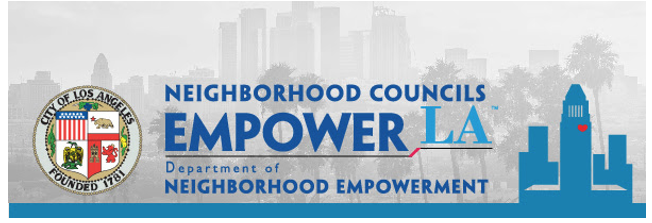
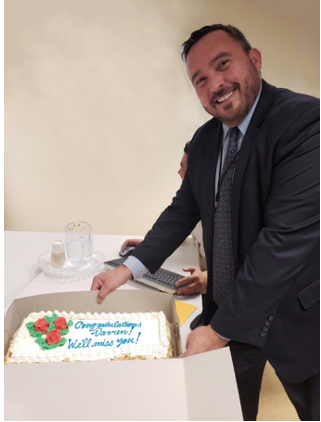
Darren Martinez – Office of Los Angeles City Attorney – Image enlarged from email below
I hope our newsletter finds you well. We had some bittersweet news this week from our City Attorney Neighborhood Council Advice Division (NCAD). Managing Deputy City Attorney Darren Martinez will be transferring to the Administrative Citation Enforcement Unit. Darren has been in the NCAD since 2001 after working on land use legal matters in the City Attorney’s Office. For the past 17 years, Darren has been invaluable in guiding the Neighborhood Council system doing everything from providing legal advice to Neighborhood Councils, the Board of Neighborhood Commissioners, and our department to conducting live Ethics trainings or legal roundtables across the City to acting in Neighborhood Council educational videos like the Brown Act and the Code of Conduct trainings. HUGE thanks to Darren for all of his dedication these many years! We wish him all the best in his new position and will miss him greatly.
Don’t forget that the Neighborhood Council Budget Advocates meet tomorrow, and I’m looking forward to stopping by Del Rey Neighborhood Council’s Del Rey Day on Sunday to be a judge on their 2nd annual Del Rey Spelling Bee.
Have a wonderful weekend!
Why is this email above important?
This email clearly shows the Office of the City Attorney requires training for the Neighborhood Councils under The Brown Act.
I wrote to EMPOWERLA regarding the potential “Brown Act” violation as it pertains to posting and concerning the email above from the Neighborhood Council President.
THE EMPOWERLA RESPONSE TO MY EMAIL:
“Dear Ms. Rowe:
Thank you for your email Dated December 18, 2020.
Regarding your Brown Act concerns, I believe that you may have misinterpreted the redacted President's response. She did not indicate that NCs are not subject to the Brown Act. It is well established that NCs are subject to many of the Brown Act provisions, specifically the physical posting requirement. However, Neighborhood Councils are not required under the Brown Act to post their agendas to their website. For reference, you may refer to California Government Code section 54954.2(d).
However, please note that Neighborhood Councils website posting policy is addressed by the Board of Neighborhood Commissioners.
What have I learned regarding “The Brown Act” since I was referred to this “EMPOWERLA NEIGHBORHOOD COUNCIL AGENDA POSTING REQUIREMENTS” document was sent to me?
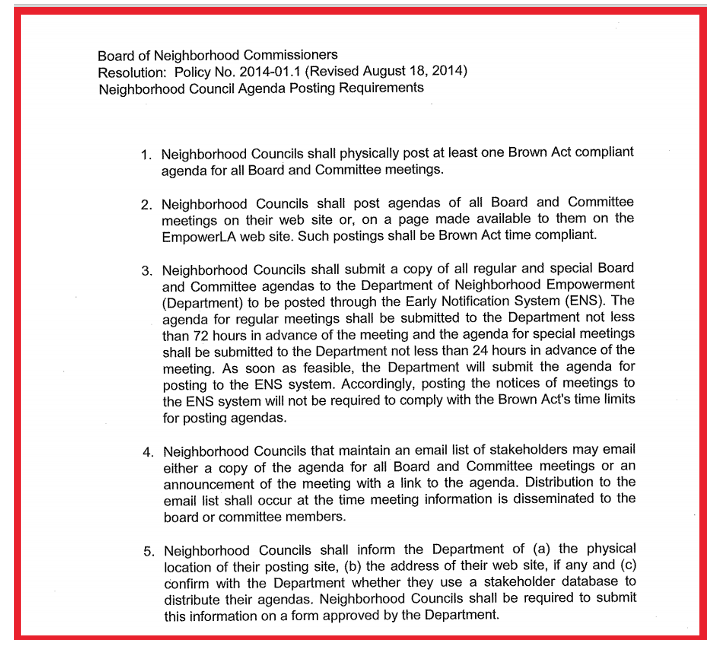
This is copied from the document from EMPOWERLA linked above. Please see the posting requirements #2 and #3 above.
The Brown Act:
“THE BROWN ACT AND NEIGHBORHOOD COUNCILS
Office of the City Attorney -Neighborhood Council Advice Division
AB1234 ETHICS TRAINING
What Is The Ralph M. Brown Act?
The Brown Act is a state law which governs open meetings for local governmental bodies. The Brown Act (also "Act") is contained in the Government Code at § 54950 et seq., and establishes rules designed to ensure that actions and deliberations of commissions, boards, councils, and other public bodies of local agencies are taken openly and with public access and input.
Why Are Neighborhood Councils Subject to The Brown Act?
The Brown Act governs the meetings of all local "legislative bodies," that is, all multimember councils, boards, commissions, committees, and the like, of a local governmental agency. Only bodies created by charter, ordinance, or the formal action of another legislative body are covered by the Act. Neighborhood councils are covered by the Brown Act because the City Charter created the system of neighborhood councils, which required the approval of a plan to implement the system, and an ordinance to implement that plan. The ordinance provides for the City to certify, and otherwise recognize neighborhood councils, as an official component of the City. This combination of features, i.e., the Charter-created system and adoption of the plan and ordinance, satisfies the "creation by charter, ordinance or formal action" test of the Act. Thus, meetings of neighborhood councils are covered by the Act.”
What does guidance above this mean to me?
This tells me that the response that I got from EMPOWERLA is inaccurate in my opinion because all requirements of “The Brown Act” for posting would apply in my opinion to the Neighborhood Councils. Since I am not an attorney – attorneys please correct me if I am not correct on my interpretation of “The Brown Act” throughout this article.
WHAT’S NEW RELATED TO “THE BROWN ACT” AND POSTINGS?
AB-2257 Local agency meetings: agenda: online posting.(2015-2016):
“As Amends the Law Today
As Amends the Law on Nov 22, 2016
SECTION 1.
Section 54954.2 of the Government Code is amended to read:
54954.2.
(a) (1) At least 72 hours before a regular meeting, the legislative body of the local agency, or its designee, shall post an agenda containing a brief general description of each item of business to be transacted or discussed at the meeting, including items to be discussed in closed session. A brief general description of an item generally need not exceed 20 words. The agenda shall specify the time and location of the regular meeting and shall be posted in a location that is freely accessible to members of the public and on the local agency’s Internet Web site, if the local agency has one. If requested, the agenda shall be made available in appropriate alternative formats to persons with a disability, as required by Section 202 of the Americans with Disabilities Act of 1990 (42 U.S.C. Sec. 12132), and the federal rules and regulations adopted in implementation thereof. The agenda shall include information regarding how, to whom, and when a request for disability-related modification or accommodation, including auxiliary aids or services, may be made by a person with a disability who requires a modification or accommodation in order to participate in the public meeting.
(2) For a meeting occurring on and after January 1, 2019, of a legislative body of a city, county, city and county, special district, school district, or political subdivision established by the state that has an Internet Web site, the following provisions shall apply:
(A) An online posting of an agenda shall be posted on the primary Internet Web site homepage of a city, county, city and county, special district, school district, or political subdivision established by the state that is accessible through a prominent, direct link to the current agenda. The direct link to the agenda shall not be in a contextual menu; however, a link in addition to the direct link to the agenda may be accessible through a contextual menu.
(B) An online posting of an agenda including, but not limited to, an agenda posted in an integrated agenda management platform, shall be posted in an open format that meets all of the following requirements:
- Retrievable, downloadable, indexable, and electronically searchable by commonly used Internet search applications.
- Platform independent and machine readable.
- Available to the public free of charge and without any restriction that would impede the reuse or redistribution of the agenda.”
Please look at the above link for the rest of the language of AB 2257. Again, I am not an attorney. Please tell me if I am misinterpreting this law to include Neighborhood Councils.
“Governor Newsom Suspends Some Brown Act Requirements in Light of COVID-19 Public Health Crisis”:
“In an effort to implement public health officials' recommendations to slow the spread of the coronavirus (COVID-19), California Gov. Gavin Newsom issued Executive Order N-29-20 on March 17, which relaxes some of the Ralph M. Brown Act's (Brown Act) public meeting requirements (Gov. Code Sec. 54950 et seq.) that are not practical in light of the current public health crisis.
The Brown Act places strict requirements on local legislative bodies regarding the posting, access and physical location of voting members during public hearings. Order N-29-20 allows public meetings to be held by video, teleconference or other electronic means during the period in which health officials have imposed or recommended social distancing measures. It further suspends numerous other Brown Act requirements, including:
- to identify the physical location of members participating by teleconference
- to post agendas at all teleconference locations
- for a quorum of the legislative body's members to be within the jurisdiction when the meeting is taking place
Instead, local legislative bodies may fulfill Brown Act requirements by allowing members of the public to observe and submit public comments through teleconference or other electronic means or combination thereof. Order N-29-20 still requires local legislative bodies to:
- provide advance notice of and post agendas for public meetings in accordance with the Brown Act's time frames
- provide information by which members of the public may observe and offer public comment
- advertise and implement a procedure for receiving and resolving reasonable Americans with Disabilities' (ADA) accommodation requests.”
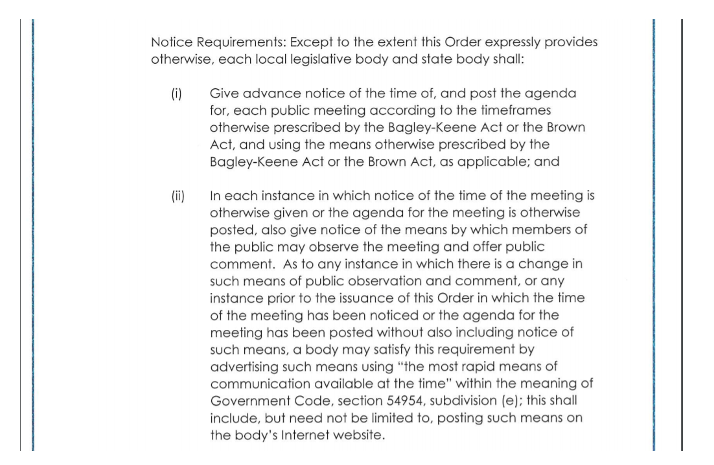
Posting requirements by Executive Order N- 29 – 20 above. Please see the link for the full content of this document.
I interpret the above language in (ii) to mean posting to the Neighborhood Council website, sending the document to EMPOWERLA for posting, and sending out emails to anyone who has chosen to give their contact information to a Neighborhood Council.
In Conclusion:
It is my opinion that – based on the email from the Neighborhood Council President above and based on the email from a member of EMPOWERLA staff, that there is inadequate training related to “The Brown Act” and how it applies to Neighborhood Councils.
From the document that is linked above from the Board of Neighborhood Commissioners. (See posting requirements).”
It states that if a Neighborhood Council is in violation of The Brown Act:
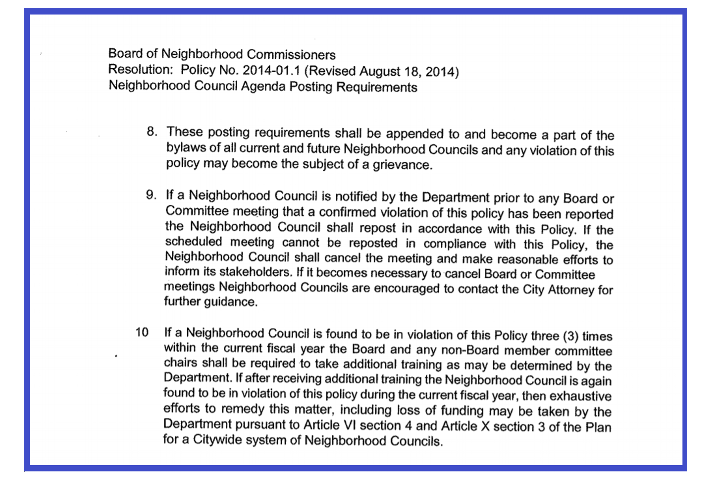
What is the remedy here?
- If the meeting as I imply did not meet the Neighborhood Council posting requirements, is the Neighborhood Council obligated to take any new actions? Are they obligated to put any of the agenda items on a future agenda?
- Will EMPOWERLA and the City Attorney’s office note that this Board met, according to my statements above, without giving the required public notice?
- Why does the City Attorney’s office not respond to stakeholders who may have legitimate questions regarding Neighborhood Councils?
- Is the City Attorney only there to protect the City Elected Officials and employees of the City?
- Does the City Attorney not represent the residents of Los Angeles?
- We as residents need to know who the City Attorney represents.
(Chris Rowe, a former health care employee who has worked at Northridge Hospital, Tarzana Medical Center, and West Hills Hospital has a B.S. in Health Education. She is a 42-year resident of West Hills. She has written for the Los Angeles Daily News, RonKayeLA.org; OurLA.org; and CityWatch. She has a blog on the USC/Annenberg Center for Health Journalism website and can be reached at [email protected]) Edited for CityWatch by Linda Abrams.






